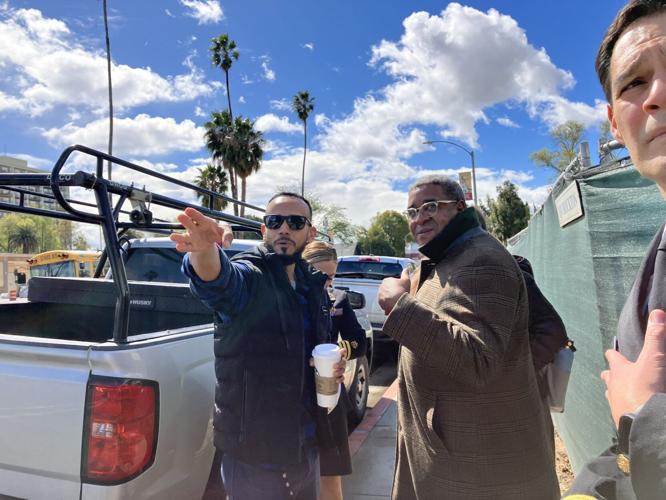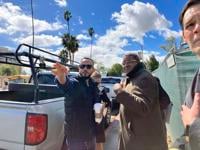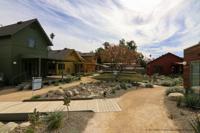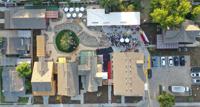
LGabriel Maldonado, left, founder and CEO next to Harold Philips Deputy Director of Programs at NMAC (National Minority AIDS Council).
Oscar never imagined that one day, the career he loved would be taken from him.
In Mexico, he worked tirelessly as a nurse, caring for patients with compassion and professionalism. But after his HIV diagnosis in 2019, everything changed.
His shifts were quietly reduced, and he was gradually excluded from areas where he had previously been scheduled to work, a prelude to the inevitable—the denial of a formal work contract. Soon after came the outright dismissal.
He was jobless and without options. Stigma and misconceptions about HIV made finding new employment in healthcare nearly impossible.
In 2022, Oscar packed his bags and came to the United States in search of a future that no longer seemed possible in his homeland. But the decision had its challenges. Without family, stable housing or a clear path forward, he struggled to get back on his feet. That was until he discoveredTruEvolution, an organization that changed his life in ways he never thought possible.

Bishop Benita Ramsey House, Bungalow 6.
Founded by Afro-Latino advocate Gabriel Maldonado, the organization stands as a beacon of support and empowerment for the LGBTQ+ community in the Riverside and San Bernardino region. The organization offers a diverse range of vital programs and services. Among them is the Inland Empire LGBTQ+ Center, which serves as a welcoming space for individuals to connect and find resources. Through "Project Legacy," they provide emergency housing, providing a stable, short-term home for those in need.
The entity also ensures free, confidential and judgment-free HIV testing services and access to pre-exposure Prophylaxis (PrEP) as a preventive measure. Its bilingual HIV support groups foster a sense of unity, while culturally competent counseling and mental health services cater to each individual's unique needs. Above all, TruEvolution nurtures a crucial sense of belonging, giving each person the opportunity to thrive in a community that truly cares.
For Oscar, it was precisely what he desperately needed.
“I was feeling terrible. I felt misunderstood, a rejected person. I had thoughts like, 'I'm going to commit suicide; I don't want to be here anymore.' Coming to this country is not easy; it's difficult to be in this country alone,” Oscar said in Spanish. “TruEvolution changed my life... I went to their offices, and they took care of me… they gave me the support I needed, listened to me, and helped me with housing. I am very happy. I am infinitely grateful to [them] because [now] I am calm and live my life in peace”.

Project Legacy campus.
"Fortaleza" is the name of the HIV support group that holds its meetings in Spanish. It provided Oscar with the connection he had been seeking, as discussing HIV with his family was impossible. He shared, "I began to feel more at ease because I could talk about my situation openly, without any taboo or judgment... meeting people who are going through the same experience is incredibly moving."
The group holds meetings every Thursday from 4:30 to 7:00 PM at the center's offices located at 3839 Brockton Ave, Riverside. During the first hour, attendants are provided with meals and an opportunity to connect with one another, fostering a sense of community. Afterward, a facilitator leads the group, introducing a topic for the week,and participants take turns sharing their experiences to encourage each other in their journey living with HIV. The group is open not only to those directly affected by HIV but also to individuals affected by it.
“Every time I see them walk out of their meetings, they look empowered […] to keep going and keep overcoming any challenges that they face,” said Laura Alvarez, case coordinator at TruEvolution.
Project Legacy
The housing aspect of the initiative consists of a campus featuring five well-maintained houses known as “Project Legacy”, which offer a total of 45 beds and includes a communal gym and laundry room. The program has a waitlist of over 700 individuals. Still, turnovers happen regularly as participants progress through a strict screening process, which includes meeting with a therapist and undergoing roommate matching, guaranteeing that each person is placed in the right environment.
Some individuals leave voluntarily for new opportunities, while sometimes others are removed due to behavioral issues. When this occurs, they immediately turn to their waitlist to start filling the space to ensure those in need receive support as soon as possible.

Aerial view of TruEvolution.
“A waitlist is not a static list that you move in a sequential order. There are times that people's situations or circumstances have a sense of severity that warrants them being moved up the list. Sometimes there's people that are in conditions that we know that death is probably the only other option if something is not addressed,” explained Maldonado. “For instance, if we have a disabled senior who is living under the freeway underpass, that may [require] a certain escalation of housing, depending on the severity of your circumstances.”
The accommodations feature well-furnished rooms, each containing two beds and two armoire dressers, complemented by fresh bedding. Each house has a fully functional kitchen that includes all essential cooking implements, and each participant is provided with a designated area for grocery storage.
The housing program integrates food assistance as a crucial component. Their case management team identifies and connects individuals to existing food resources within the county, such as food pantries, food banks and available vouchers. Often, people are unaware of how to access these resources, making this guidance essential. In urgent situations where no other options are available, the organization provides food directly, whether through hot meals or grocery purchases.
[It’s] incredibly valued just to know that you have a stable [..] home base […] They're [the houses] well appointed. Things are taken care of, the property is up to date, and whether you think about it or not, that's a boost to your self-esteem. It's a boost to your positive outlook on things. It's not just a mattress in a corner,” said Richard King, a participant in the program.
Creating a plan for clients to move forward
“With our clients, what we do is [..] a three-month plan.What would you like to have completed in those three months? How much would you like to have saved? Working on credit as well is important,” explained Elia Castro, client support specialist at TruEvolution.
She explained that the program has helped clients successfully transition out, enabling them to save money and build financial stability. Some have managed to afford a car or create a savings foundation. Using a metaphor, she described the program's mission as moving clients from "a pillow to keys," symbolizing their journey toward greater independence. Whether it’s securing keys to a home or a vehicle for reliable transportation, the goal is to see clients grow, succeed and achieve stability in their lives.
In this aspect, the center focuses on providing services that help participants prepare for the next chapter in their lives, especially entering the workforce. The primary emphasis is on job readiness, ensuring that individuals develop the necessary skills and confidence to succeed in employment.
As explained by Maldonado, many participants have limited work experience, mainly in fast food or retail, and struggle with basic workplace expectations, hygiene and job search skills. The team addresses these challenges by providing essential tools to help participants secure and maintain employment. While job placement is a future goal, the current focus is ensuring participants are truly ready for available job opportunities.
“I even go as far as assisting clients with their resumes and helping them apply for jobs if they're interested in finding employment. Sometimes it's something related to school, even them not knowing where to begin with applying for schools. Whatever it is that they're looking for, I work with them one on one to hopefully achieve those positive outcomes,” said Alvarez.
The organization's support for the Latino community.
According to Maldonado, the center's community reflects the diversity of the population it serves, with Latinos consistently making up the majority, often comprising 40 to 60% of the participants. While the organization also serves clients from various backgrounds, including White, African American, Asian and Pacific Islander communities, Latinos remain the dominant group. The institution is also one of the few service providers offering support to undocumented individuals, a practice that many hesitate to engage in, particularly given the current social and political climate.
Being culturally competent is another factor they pursue, committing to bilingualism in all communication efforts, from social media posts to newsletters. Every media produced is available in both English and Spanish. Still, it's not just about language—it’s about cultural intentionality, which extends to food offerings and vendor selections. For example, they prioritize culturally familiar foods like tacos or pupusas when catering, aiming to create an inclusive environment that celebrates Latino traditions and needs. This thoughtful approach goes beyond core services to offer a cultural experience often missing in other settings.
“I defend TruEvolution to the hilt. They have supported me with housing and groceries... [without them] I would be dead,” Alberto said in Spanish, a participant in the housing program. Alberto prefers to be referred by first name only.

















(0) comments
Welcome to the discussion.
Log In
Keep it Clean. Please avoid obscene, vulgar, lewd, racist or sexually-oriented language.
PLEASE TURN OFF YOUR CAPS LOCK.
Don't Threaten. Threats of harming another person will not be tolerated.
Be Truthful. Don't knowingly lie about anyone or anything.
Be Nice. No racism, sexism or any sort of -ism that is degrading to another person.
Be Proactive. Use the 'Report' link on each comment to let us know of abusive posts.
Share with Us. We'd love to hear eyewitness accounts, the history behind an article.